Business Ethics Report: Samsung Bribery Scandal, Module ABC123
VerifiedAdded on 2023/01/11
|12
|3315
|79
Report
AI Summary
This report examines the Samsung bribery scandal, where the company faced allegations of bribery and political activities. It begins with an executive summary and an introduction to business ethics, then details the ethical issues, including the bribery of government officials, and how Samsung handled these issues. The report investigates the concept of sustainability using the triple bottom line model. It then applies relevant business ethics theories, including normative and descriptive approaches like deontology, virtue ethics, ethical egoism, utilitarianism, and Kantianism, to analyze the case. Finally, the report considers the perspectives of various stakeholders impacted by the scandal, including shareholders, customers, and the government, concluding with a summary of the findings and references.
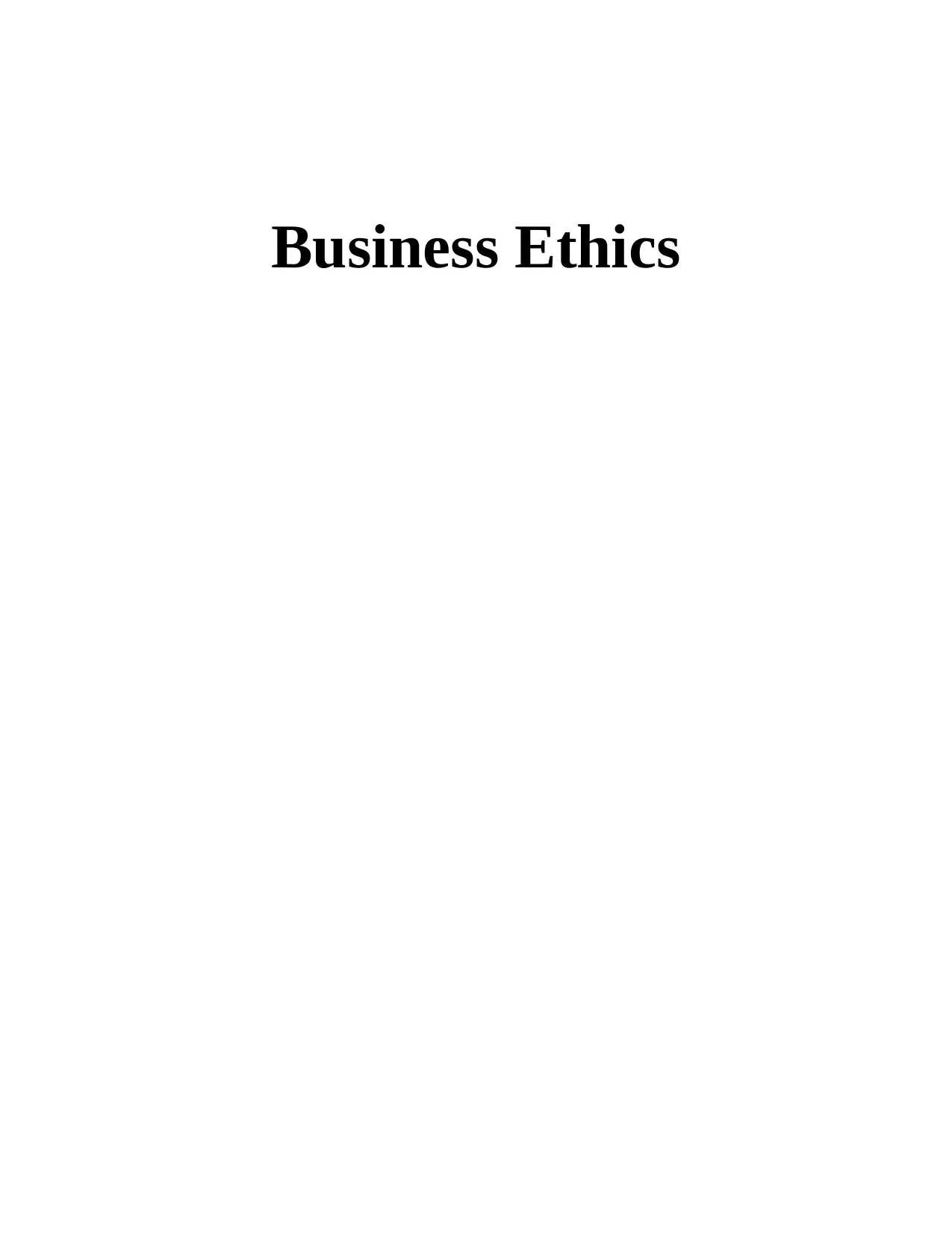
Business Ethics
Paraphrase This Document
Need a fresh take? Get an instant paraphrase of this document with our AI Paraphraser
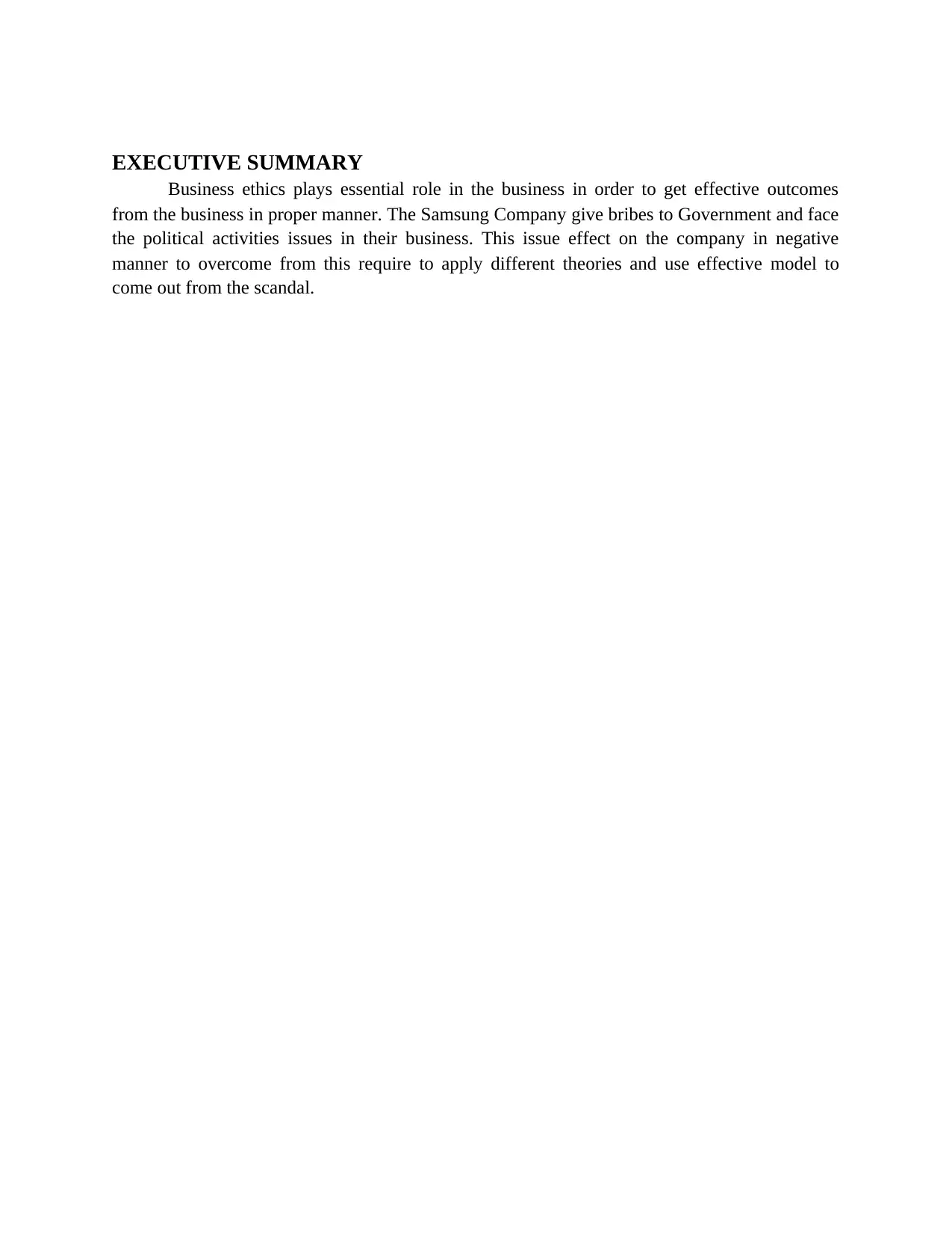
EXECUTIVE SUMMARY
Business ethics plays essential role in the business in order to get effective outcomes
from the business in proper manner. The Samsung Company give bribes to Government and face
the political activities issues in their business. This issue effect on the company in negative
manner to overcome from this require to apply different theories and use effective model to
come out from the scandal.
Business ethics plays essential role in the business in order to get effective outcomes
from the business in proper manner. The Samsung Company give bribes to Government and face
the political activities issues in their business. This issue effect on the company in negative
manner to overcome from this require to apply different theories and use effective model to
come out from the scandal.
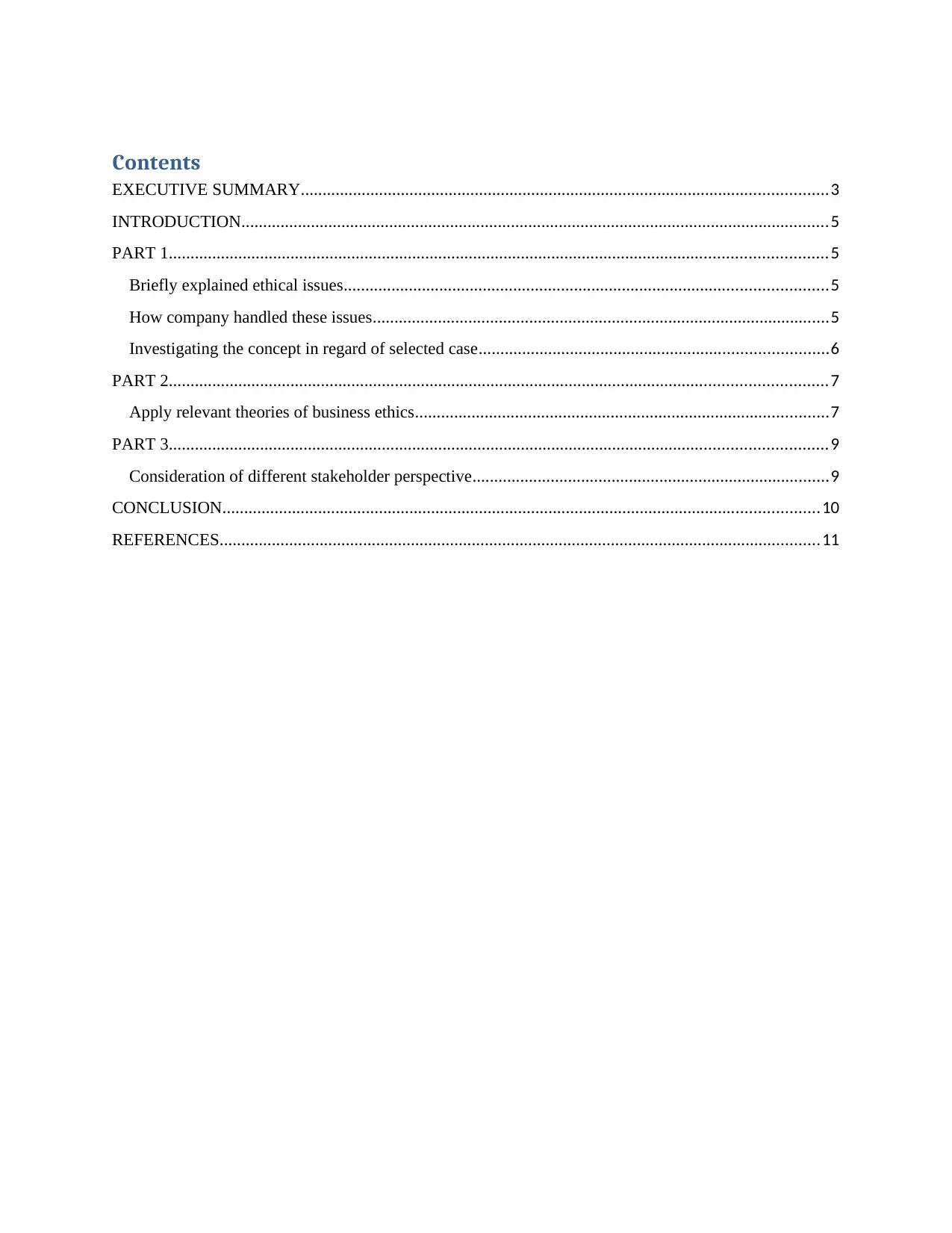
Contents
EXECUTIVE SUMMARY.........................................................................................................................3
INTRODUCTION.......................................................................................................................................5
PART 1.......................................................................................................................................................5
Briefly explained ethical issues...............................................................................................................5
How company handled these issues.........................................................................................................5
Investigating the concept in regard of selected case................................................................................6
PART 2.......................................................................................................................................................7
Apply relevant theories of business ethics...............................................................................................7
PART 3.......................................................................................................................................................9
Consideration of different stakeholder perspective..................................................................................9
CONCLUSION.........................................................................................................................................10
REFERENCES..........................................................................................................................................11
EXECUTIVE SUMMARY.........................................................................................................................3
INTRODUCTION.......................................................................................................................................5
PART 1.......................................................................................................................................................5
Briefly explained ethical issues...............................................................................................................5
How company handled these issues.........................................................................................................5
Investigating the concept in regard of selected case................................................................................6
PART 2.......................................................................................................................................................7
Apply relevant theories of business ethics...............................................................................................7
PART 3.......................................................................................................................................................9
Consideration of different stakeholder perspective..................................................................................9
CONCLUSION.........................................................................................................................................10
REFERENCES..........................................................................................................................................11
⊘ This is a preview!⊘
Do you want full access?
Subscribe today to unlock all pages.

Trusted by 1+ million students worldwide
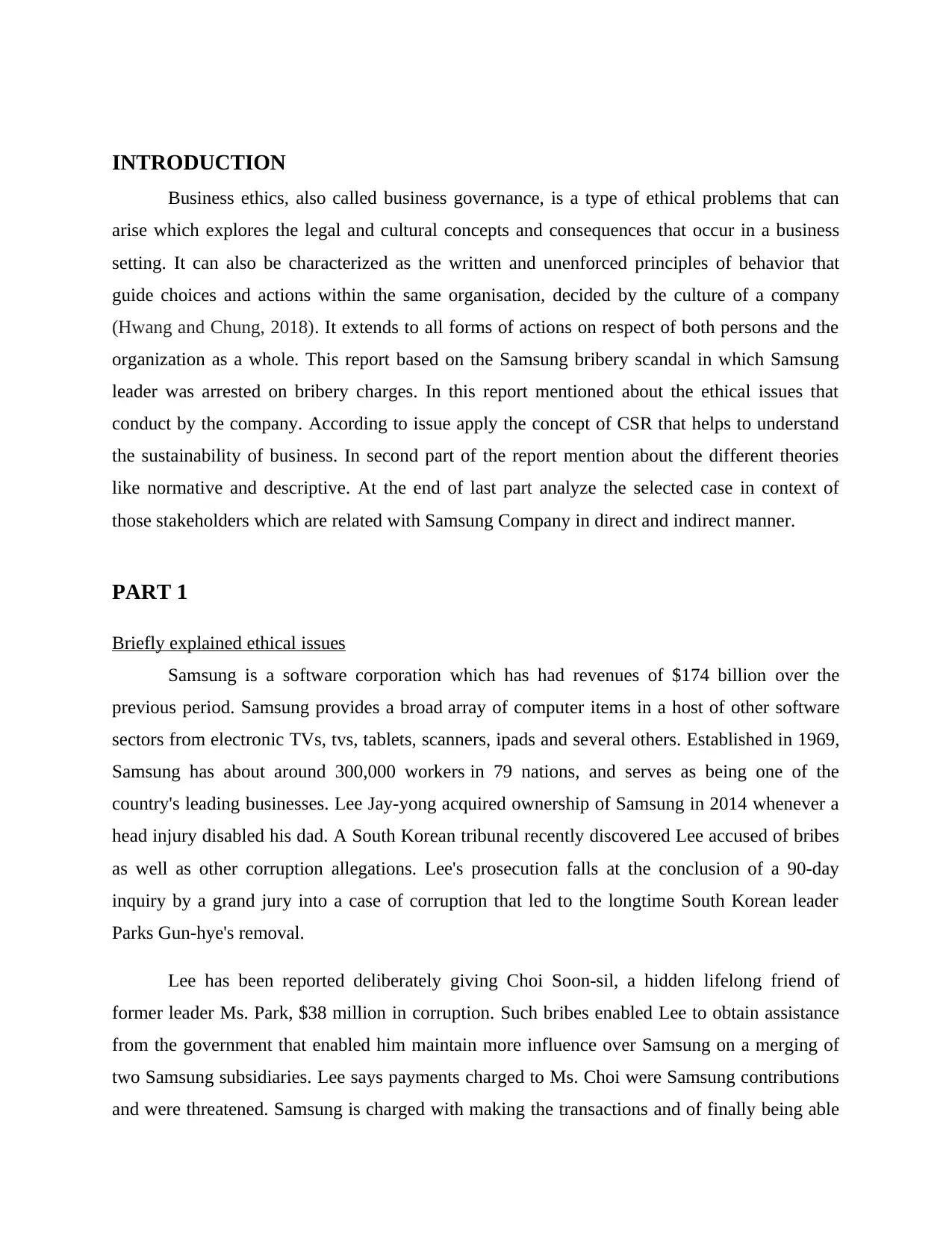
INTRODUCTION
Business ethics, also called business governance, is a type of ethical problems that can
arise which explores the legal and cultural concepts and consequences that occur in a business
setting. It can also be characterized as the written and unenforced principles of behavior that
guide choices and actions within the same organisation, decided by the culture of a company
(Hwang and Chung, 2018). It extends to all forms of actions on respect of both persons and the
organization as a whole. This report based on the Samsung bribery scandal in which Samsung
leader was arrested on bribery charges. In this report mentioned about the ethical issues that
conduct by the company. According to issue apply the concept of CSR that helps to understand
the sustainability of business. In second part of the report mention about the different theories
like normative and descriptive. At the end of last part analyze the selected case in context of
those stakeholders which are related with Samsung Company in direct and indirect manner.
PART 1
Briefly explained ethical issues
Samsung is a software corporation which has had revenues of $174 billion over the
previous period. Samsung provides a broad array of computer items in a host of other software
sectors from electronic TVs, tvs, tablets, scanners, ipads and several others. Established in 1969,
Samsung has about around 300,000 workers in 79 nations, and serves as being one of the
country's leading businesses. Lee Jay-yong acquired ownership of Samsung in 2014 whenever a
head injury disabled his dad. A South Korean tribunal recently discovered Lee accused of bribes
as well as other corruption allegations. Lee's prosecution falls at the conclusion of a 90-day
inquiry by a grand jury into a case of corruption that led to the longtime South Korean leader
Parks Gun-hye's removal.
Lee has been reported deliberately giving Choi Soon-sil, a hidden lifelong friend of
former leader Ms. Park, $38 million in corruption. Such bribes enabled Lee to obtain assistance
from the government that enabled him maintain more influence over Samsung on a merging of
two Samsung subsidiaries. Lee says payments charged to Ms. Choi were Samsung contributions
and were threatened. Samsung is charged with making the transactions and of finally being able
Business ethics, also called business governance, is a type of ethical problems that can
arise which explores the legal and cultural concepts and consequences that occur in a business
setting. It can also be characterized as the written and unenforced principles of behavior that
guide choices and actions within the same organisation, decided by the culture of a company
(Hwang and Chung, 2018). It extends to all forms of actions on respect of both persons and the
organization as a whole. This report based on the Samsung bribery scandal in which Samsung
leader was arrested on bribery charges. In this report mentioned about the ethical issues that
conduct by the company. According to issue apply the concept of CSR that helps to understand
the sustainability of business. In second part of the report mention about the different theories
like normative and descriptive. At the end of last part analyze the selected case in context of
those stakeholders which are related with Samsung Company in direct and indirect manner.
PART 1
Briefly explained ethical issues
Samsung is a software corporation which has had revenues of $174 billion over the
previous period. Samsung provides a broad array of computer items in a host of other software
sectors from electronic TVs, tvs, tablets, scanners, ipads and several others. Established in 1969,
Samsung has about around 300,000 workers in 79 nations, and serves as being one of the
country's leading businesses. Lee Jay-yong acquired ownership of Samsung in 2014 whenever a
head injury disabled his dad. A South Korean tribunal recently discovered Lee accused of bribes
as well as other corruption allegations. Lee's prosecution falls at the conclusion of a 90-day
inquiry by a grand jury into a case of corruption that led to the longtime South Korean leader
Parks Gun-hye's removal.
Lee has been reported deliberately giving Choi Soon-sil, a hidden lifelong friend of
former leader Ms. Park, $38 million in corruption. Such bribes enabled Lee to obtain assistance
from the government that enabled him maintain more influence over Samsung on a merging of
two Samsung subsidiaries. Lee says payments charged to Ms. Choi were Samsung contributions
and were threatened. Samsung is charged with making the transactions and of finally being able
Paraphrase This Document
Need a fresh take? Get an instant paraphrase of this document with our AI Paraphraser
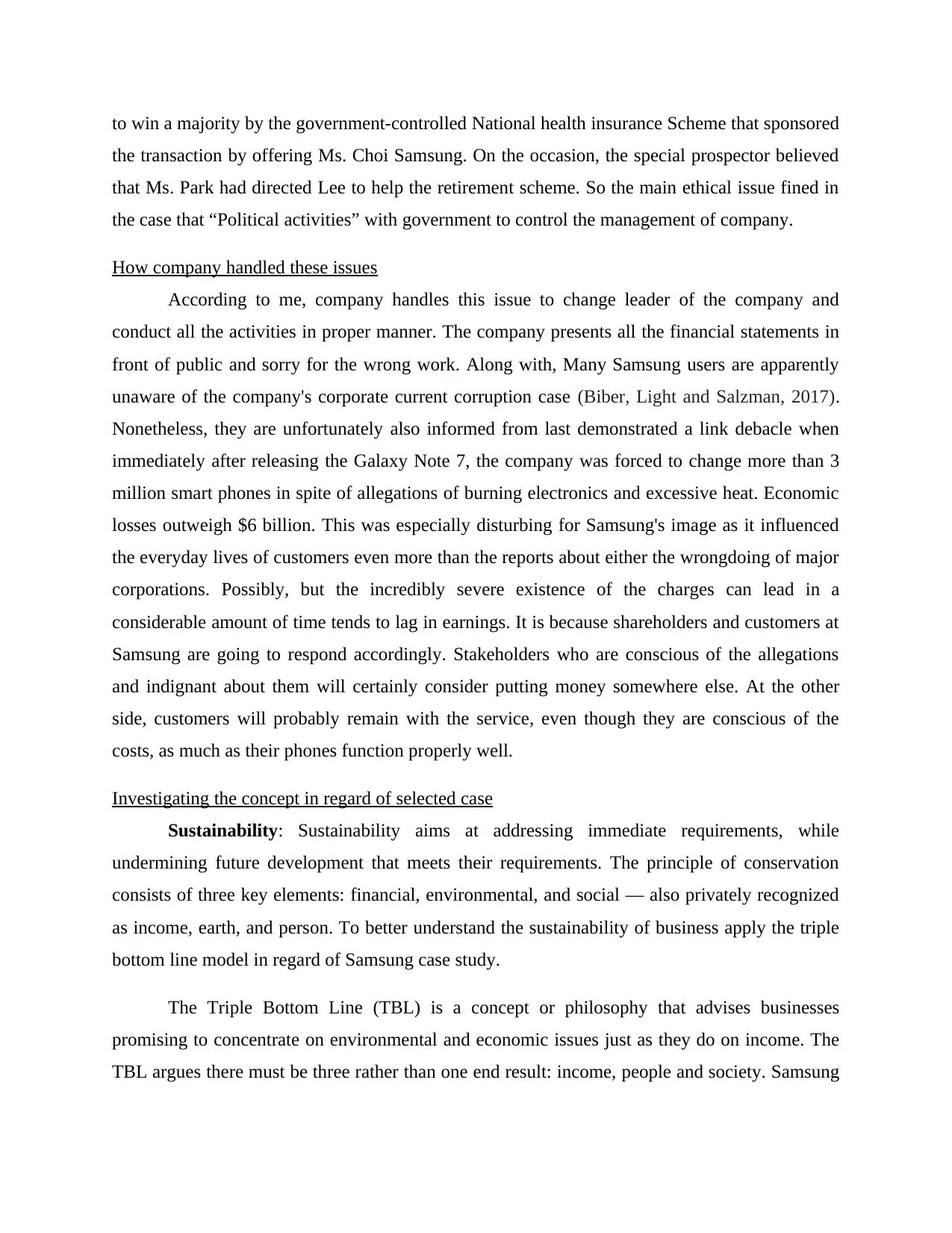
to win a majority by the government-controlled National health insurance Scheme that sponsored
the transaction by offering Ms. Choi Samsung. On the occasion, the special prospector believed
that Ms. Park had directed Lee to help the retirement scheme. So the main ethical issue fined in
the case that “Political activities” with government to control the management of company.
How company handled these issues
According to me, company handles this issue to change leader of the company and
conduct all the activities in proper manner. The company presents all the financial statements in
front of public and sorry for the wrong work. Along with, Many Samsung users are apparently
unaware of the company's corporate current corruption case (Biber, Light and Salzman, 2017).
Nonetheless, they are unfortunately also informed from last demonstrated a link debacle when
immediately after releasing the Galaxy Note 7, the company was forced to change more than 3
million smart phones in spite of allegations of burning electronics and excessive heat. Economic
losses outweigh $6 billion. This was especially disturbing for Samsung's image as it influenced
the everyday lives of customers even more than the reports about either the wrongdoing of major
corporations. Possibly, but the incredibly severe existence of the charges can lead in a
considerable amount of time tends to lag in earnings. It is because shareholders and customers at
Samsung are going to respond accordingly. Stakeholders who are conscious of the allegations
and indignant about them will certainly consider putting money somewhere else. At the other
side, customers will probably remain with the service, even though they are conscious of the
costs, as much as their phones function properly well.
Investigating the concept in regard of selected case
Sustainability: Sustainability aims at addressing immediate requirements, while
undermining future development that meets their requirements. The principle of conservation
consists of three key elements: financial, environmental, and social — also privately recognized
as income, earth, and person. To better understand the sustainability of business apply the triple
bottom line model in regard of Samsung case study.
The Triple Bottom Line (TBL) is a concept or philosophy that advises businesses
promising to concentrate on environmental and economic issues just as they do on income. The
TBL argues there must be three rather than one end result: income, people and society. Samsung
the transaction by offering Ms. Choi Samsung. On the occasion, the special prospector believed
that Ms. Park had directed Lee to help the retirement scheme. So the main ethical issue fined in
the case that “Political activities” with government to control the management of company.
How company handled these issues
According to me, company handles this issue to change leader of the company and
conduct all the activities in proper manner. The company presents all the financial statements in
front of public and sorry for the wrong work. Along with, Many Samsung users are apparently
unaware of the company's corporate current corruption case (Biber, Light and Salzman, 2017).
Nonetheless, they are unfortunately also informed from last demonstrated a link debacle when
immediately after releasing the Galaxy Note 7, the company was forced to change more than 3
million smart phones in spite of allegations of burning electronics and excessive heat. Economic
losses outweigh $6 billion. This was especially disturbing for Samsung's image as it influenced
the everyday lives of customers even more than the reports about either the wrongdoing of major
corporations. Possibly, but the incredibly severe existence of the charges can lead in a
considerable amount of time tends to lag in earnings. It is because shareholders and customers at
Samsung are going to respond accordingly. Stakeholders who are conscious of the allegations
and indignant about them will certainly consider putting money somewhere else. At the other
side, customers will probably remain with the service, even though they are conscious of the
costs, as much as their phones function properly well.
Investigating the concept in regard of selected case
Sustainability: Sustainability aims at addressing immediate requirements, while
undermining future development that meets their requirements. The principle of conservation
consists of three key elements: financial, environmental, and social — also privately recognized
as income, earth, and person. To better understand the sustainability of business apply the triple
bottom line model in regard of Samsung case study.
The Triple Bottom Line (TBL) is a concept or philosophy that advises businesses
promising to concentrate on environmental and economic issues just as they do on income. The
TBL argues there must be three rather than one end result: income, people and society. Samsung
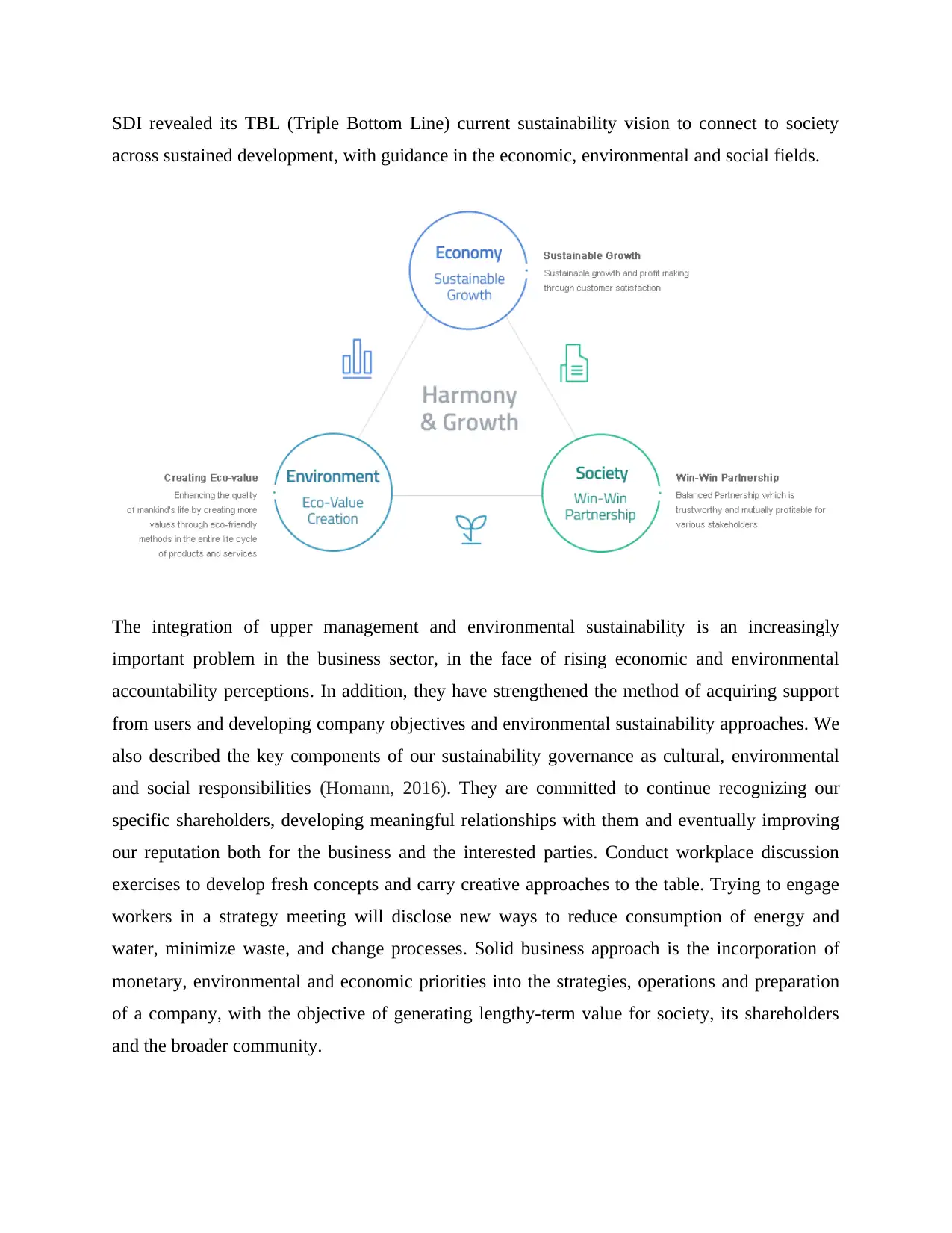
SDI revealed its TBL (Triple Bottom Line) current sustainability vision to connect to society
across sustained development, with guidance in the economic, environmental and social fields.
The integration of upper management and environmental sustainability is an increasingly
important problem in the business sector, in the face of rising economic and environmental
accountability perceptions. In addition, they have strengthened the method of acquiring support
from users and developing company objectives and environmental sustainability approaches. We
also described the key components of our sustainability governance as cultural, environmental
and social responsibilities (Homann, 2016). They are committed to continue recognizing our
specific shareholders, developing meaningful relationships with them and eventually improving
our reputation both for the business and the interested parties. Conduct workplace discussion
exercises to develop fresh concepts and carry creative approaches to the table. Trying to engage
workers in a strategy meeting will disclose new ways to reduce consumption of energy and
water, minimize waste, and change processes. Solid business approach is the incorporation of
monetary, environmental and economic priorities into the strategies, operations and preparation
of a company, with the objective of generating lengthy-term value for society, its shareholders
and the broader community.
across sustained development, with guidance in the economic, environmental and social fields.
The integration of upper management and environmental sustainability is an increasingly
important problem in the business sector, in the face of rising economic and environmental
accountability perceptions. In addition, they have strengthened the method of acquiring support
from users and developing company objectives and environmental sustainability approaches. We
also described the key components of our sustainability governance as cultural, environmental
and social responsibilities (Homann, 2016). They are committed to continue recognizing our
specific shareholders, developing meaningful relationships with them and eventually improving
our reputation both for the business and the interested parties. Conduct workplace discussion
exercises to develop fresh concepts and carry creative approaches to the table. Trying to engage
workers in a strategy meeting will disclose new ways to reduce consumption of energy and
water, minimize waste, and change processes. Solid business approach is the incorporation of
monetary, environmental and economic priorities into the strategies, operations and preparation
of a company, with the objective of generating lengthy-term value for society, its shareholders
and the broader community.
⊘ This is a preview!⊘
Do you want full access?
Subscribe today to unlock all pages.

Trusted by 1+ million students worldwide
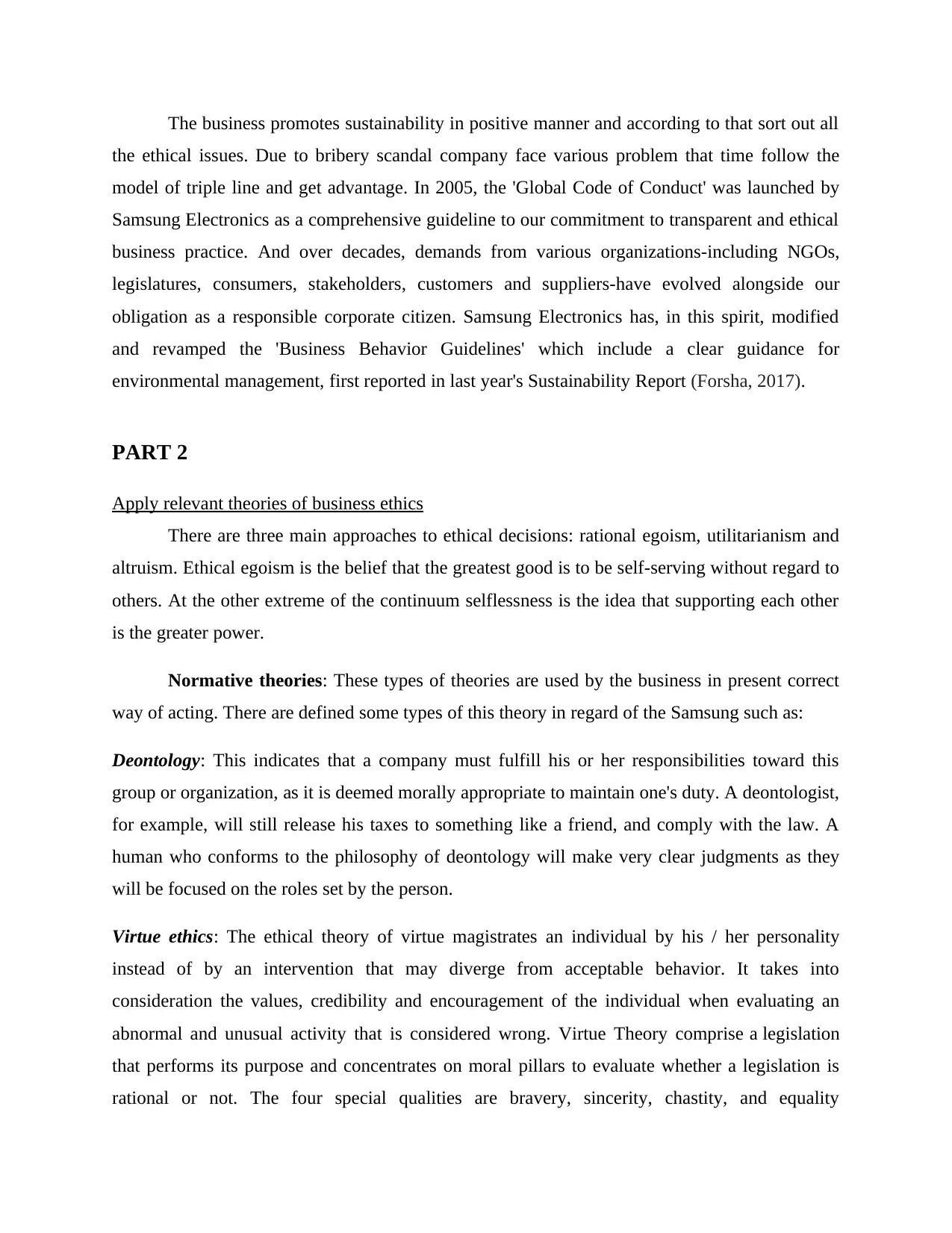
The business promotes sustainability in positive manner and according to that sort out all
the ethical issues. Due to bribery scandal company face various problem that time follow the
model of triple line and get advantage. In 2005, the 'Global Code of Conduct' was launched by
Samsung Electronics as a comprehensive guideline to our commitment to transparent and ethical
business practice. And over decades, demands from various organizations-including NGOs,
legislatures, consumers, stakeholders, customers and suppliers-have evolved alongside our
obligation as a responsible corporate citizen. Samsung Electronics has, in this spirit, modified
and revamped the 'Business Behavior Guidelines' which include a clear guidance for
environmental management, first reported in last year's Sustainability Report (Forsha, 2017).
PART 2
Apply relevant theories of business ethics
There are three main approaches to ethical decisions: rational egoism, utilitarianism and
altruism. Ethical egoism is the belief that the greatest good is to be self-serving without regard to
others. At the other extreme of the continuum selflessness is the idea that supporting each other
is the greater power.
Normative theories: These types of theories are used by the business in present correct
way of acting. There are defined some types of this theory in regard of the Samsung such as:
Deontology: This indicates that a company must fulfill his or her responsibilities toward this
group or organization, as it is deemed morally appropriate to maintain one's duty. A deontologist,
for example, will still release his taxes to something like a friend, and comply with the law. A
human who conforms to the philosophy of deontology will make very clear judgments as they
will be focused on the roles set by the person.
Virtue ethics: The ethical theory of virtue magistrates an individual by his / her personality
instead of by an intervention that may diverge from acceptable behavior. It takes into
consideration the values, credibility and encouragement of the individual when evaluating an
abnormal and unusual activity that is considered wrong. Virtue Theory comprise a legislation
that performs its purpose and concentrates on moral pillars to evaluate whether a legislation is
rational or not. The four special qualities are bravery, sincerity, chastity, and equality
the ethical issues. Due to bribery scandal company face various problem that time follow the
model of triple line and get advantage. In 2005, the 'Global Code of Conduct' was launched by
Samsung Electronics as a comprehensive guideline to our commitment to transparent and ethical
business practice. And over decades, demands from various organizations-including NGOs,
legislatures, consumers, stakeholders, customers and suppliers-have evolved alongside our
obligation as a responsible corporate citizen. Samsung Electronics has, in this spirit, modified
and revamped the 'Business Behavior Guidelines' which include a clear guidance for
environmental management, first reported in last year's Sustainability Report (Forsha, 2017).
PART 2
Apply relevant theories of business ethics
There are three main approaches to ethical decisions: rational egoism, utilitarianism and
altruism. Ethical egoism is the belief that the greatest good is to be self-serving without regard to
others. At the other extreme of the continuum selflessness is the idea that supporting each other
is the greater power.
Normative theories: These types of theories are used by the business in present correct
way of acting. There are defined some types of this theory in regard of the Samsung such as:
Deontology: This indicates that a company must fulfill his or her responsibilities toward this
group or organization, as it is deemed morally appropriate to maintain one's duty. A deontologist,
for example, will still release his taxes to something like a friend, and comply with the law. A
human who conforms to the philosophy of deontology will make very clear judgments as they
will be focused on the roles set by the person.
Virtue ethics: The ethical theory of virtue magistrates an individual by his / her personality
instead of by an intervention that may diverge from acceptable behavior. It takes into
consideration the values, credibility and encouragement of the individual when evaluating an
abnormal and unusual activity that is considered wrong. Virtue Theory comprise a legislation
that performs its purpose and concentrates on moral pillars to evaluate whether a legislation is
rational or not. The four special qualities are bravery, sincerity, chastity, and equality
Paraphrase This Document
Need a fresh take? Get an instant paraphrase of this document with our AI Paraphraser
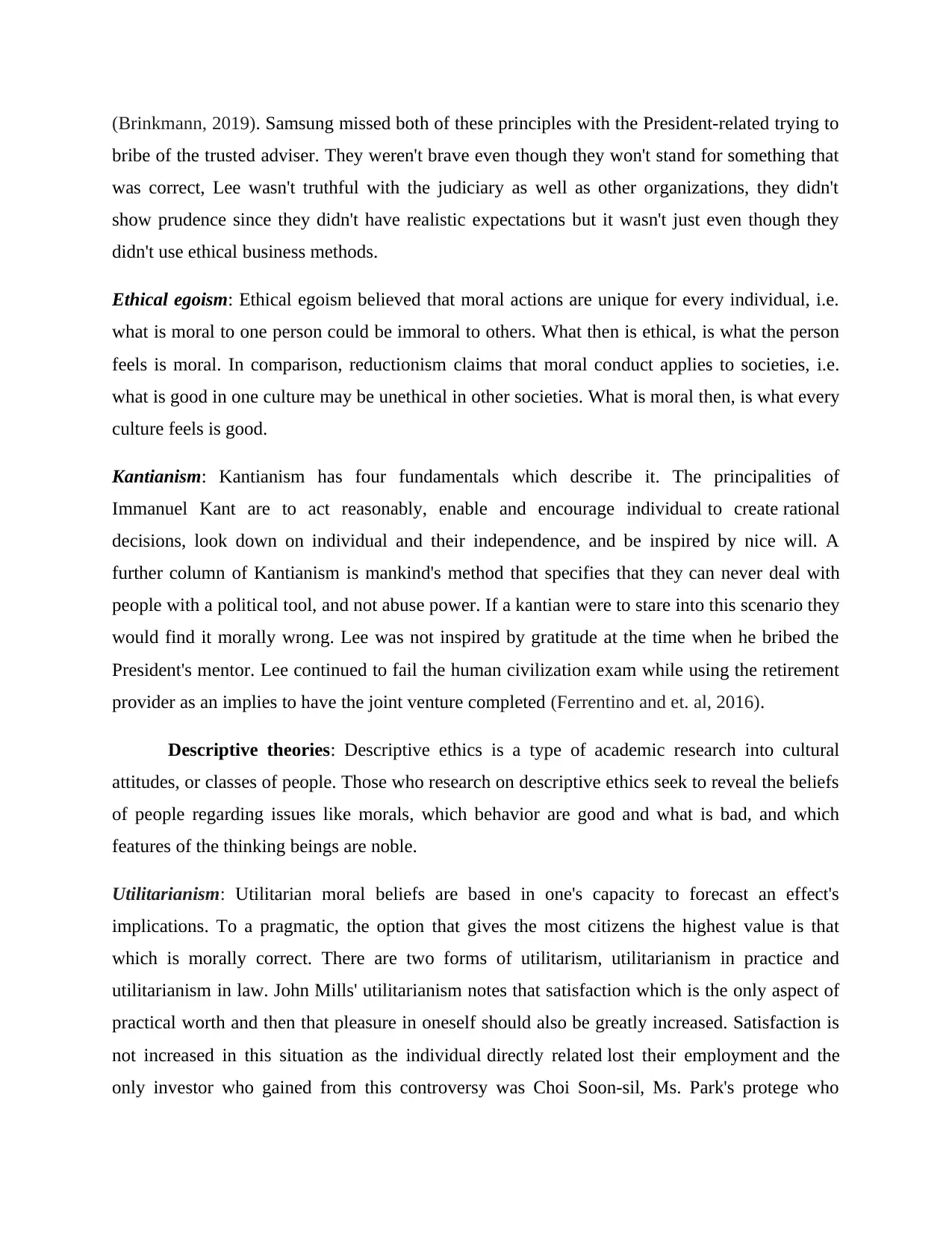
(Brinkmann, 2019). Samsung missed both of these principles with the President-related trying to
bribe of the trusted adviser. They weren't brave even though they won't stand for something that
was correct, Lee wasn't truthful with the judiciary as well as other organizations, they didn't
show prudence since they didn't have realistic expectations but it wasn't just even though they
didn't use ethical business methods.
Ethical egoism: Ethical egoism believed that moral actions are unique for every individual, i.e.
what is moral to one person could be immoral to others. What then is ethical, is what the person
feels is moral. In comparison, reductionism claims that moral conduct applies to societies, i.e.
what is good in one culture may be unethical in other societies. What is moral then, is what every
culture feels is good.
Kantianism: Kantianism has four fundamentals which describe it. The principalities of
Immanuel Kant are to act reasonably, enable and encourage individual to create rational
decisions, look down on individual and their independence, and be inspired by nice will. A
further column of Kantianism is mankind's method that specifies that they can never deal with
people with a political tool, and not abuse power. If a kantian were to stare into this scenario they
would find it morally wrong. Lee was not inspired by gratitude at the time when he bribed the
President's mentor. Lee continued to fail the human civilization exam while using the retirement
provider as an implies to have the joint venture completed (Ferrentino and et. al, 2016).
Descriptive theories: Descriptive ethics is a type of academic research into cultural
attitudes, or classes of people. Those who research on descriptive ethics seek to reveal the beliefs
of people regarding issues like morals, which behavior are good and what is bad, and which
features of the thinking beings are noble.
Utilitarianism: Utilitarian moral beliefs are based in one's capacity to forecast an effect's
implications. To a pragmatic, the option that gives the most citizens the highest value is that
which is morally correct. There are two forms of utilitarism, utilitarianism in practice and
utilitarianism in law. John Mills' utilitarianism notes that satisfaction which is the only aspect of
practical worth and then that pleasure in oneself should also be greatly increased. Satisfaction is
not increased in this situation as the individual directly related lost their employment and the
only investor who gained from this controversy was Choi Soon-sil, Ms. Park's protege who
bribe of the trusted adviser. They weren't brave even though they won't stand for something that
was correct, Lee wasn't truthful with the judiciary as well as other organizations, they didn't
show prudence since they didn't have realistic expectations but it wasn't just even though they
didn't use ethical business methods.
Ethical egoism: Ethical egoism believed that moral actions are unique for every individual, i.e.
what is moral to one person could be immoral to others. What then is ethical, is what the person
feels is moral. In comparison, reductionism claims that moral conduct applies to societies, i.e.
what is good in one culture may be unethical in other societies. What is moral then, is what every
culture feels is good.
Kantianism: Kantianism has four fundamentals which describe it. The principalities of
Immanuel Kant are to act reasonably, enable and encourage individual to create rational
decisions, look down on individual and their independence, and be inspired by nice will. A
further column of Kantianism is mankind's method that specifies that they can never deal with
people with a political tool, and not abuse power. If a kantian were to stare into this scenario they
would find it morally wrong. Lee was not inspired by gratitude at the time when he bribed the
President's mentor. Lee continued to fail the human civilization exam while using the retirement
provider as an implies to have the joint venture completed (Ferrentino and et. al, 2016).
Descriptive theories: Descriptive ethics is a type of academic research into cultural
attitudes, or classes of people. Those who research on descriptive ethics seek to reveal the beliefs
of people regarding issues like morals, which behavior are good and what is bad, and which
features of the thinking beings are noble.
Utilitarianism: Utilitarian moral beliefs are based in one's capacity to forecast an effect's
implications. To a pragmatic, the option that gives the most citizens the highest value is that
which is morally correct. There are two forms of utilitarism, utilitarianism in practice and
utilitarianism in law. John Mills' utilitarianism notes that satisfaction which is the only aspect of
practical worth and then that pleasure in oneself should also be greatly increased. Satisfaction is
not increased in this situation as the individual directly related lost their employment and the
only investor who gained from this controversy was Choi Soon-sil, Ms. Park's protege who
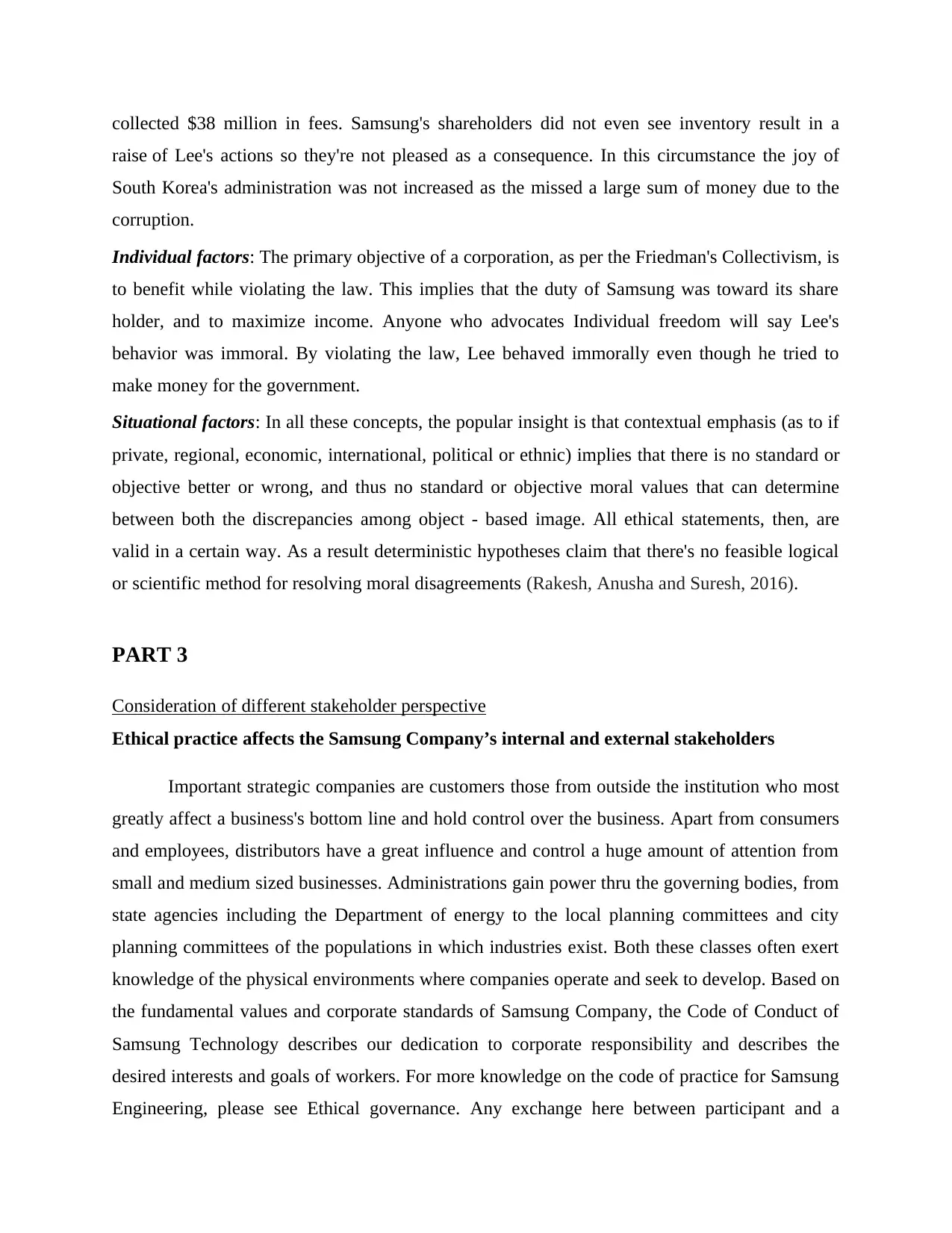
collected $38 million in fees. Samsung's shareholders did not even see inventory result in a
raise of Lee's actions so they're not pleased as a consequence. In this circumstance the joy of
South Korea's administration was not increased as the missed a large sum of money due to the
corruption.
Individual factors: The primary objective of a corporation, as per the Friedman's Collectivism, is
to benefit while violating the law. This implies that the duty of Samsung was toward its share
holder, and to maximize income. Anyone who advocates Individual freedom will say Lee's
behavior was immoral. By violating the law, Lee behaved immorally even though he tried to
make money for the government.
Situational factors: In all these concepts, the popular insight is that contextual emphasis (as to if
private, regional, economic, international, political or ethnic) implies that there is no standard or
objective better or wrong, and thus no standard or objective moral values that can determine
between both the discrepancies among object - based image. All ethical statements, then, are
valid in a certain way. As a result deterministic hypotheses claim that there's no feasible logical
or scientific method for resolving moral disagreements (Rakesh, Anusha and Suresh, 2016).
PART 3
Consideration of different stakeholder perspective
Ethical practice affects the Samsung Company’s internal and external stakeholders
Important strategic companies are customers those from outside the institution who most
greatly affect a business's bottom line and hold control over the business. Apart from consumers
and employees, distributors have a great influence and control a huge amount of attention from
small and medium sized businesses. Administrations gain power thru the governing bodies, from
state agencies including the Department of energy to the local planning committees and city
planning committees of the populations in which industries exist. Both these classes often exert
knowledge of the physical environments where companies operate and seek to develop. Based on
the fundamental values and corporate standards of Samsung Company, the Code of Conduct of
Samsung Technology describes our dedication to corporate responsibility and describes the
desired interests and goals of workers. For more knowledge on the code of practice for Samsung
Engineering, please see Ethical governance. Any exchange here between participant and a
raise of Lee's actions so they're not pleased as a consequence. In this circumstance the joy of
South Korea's administration was not increased as the missed a large sum of money due to the
corruption.
Individual factors: The primary objective of a corporation, as per the Friedman's Collectivism, is
to benefit while violating the law. This implies that the duty of Samsung was toward its share
holder, and to maximize income. Anyone who advocates Individual freedom will say Lee's
behavior was immoral. By violating the law, Lee behaved immorally even though he tried to
make money for the government.
Situational factors: In all these concepts, the popular insight is that contextual emphasis (as to if
private, regional, economic, international, political or ethnic) implies that there is no standard or
objective better or wrong, and thus no standard or objective moral values that can determine
between both the discrepancies among object - based image. All ethical statements, then, are
valid in a certain way. As a result deterministic hypotheses claim that there's no feasible logical
or scientific method for resolving moral disagreements (Rakesh, Anusha and Suresh, 2016).
PART 3
Consideration of different stakeholder perspective
Ethical practice affects the Samsung Company’s internal and external stakeholders
Important strategic companies are customers those from outside the institution who most
greatly affect a business's bottom line and hold control over the business. Apart from consumers
and employees, distributors have a great influence and control a huge amount of attention from
small and medium sized businesses. Administrations gain power thru the governing bodies, from
state agencies including the Department of energy to the local planning committees and city
planning committees of the populations in which industries exist. Both these classes often exert
knowledge of the physical environments where companies operate and seek to develop. Based on
the fundamental values and corporate standards of Samsung Company, the Code of Conduct of
Samsung Technology describes our dedication to corporate responsibility and describes the
desired interests and goals of workers. For more knowledge on the code of practice for Samsung
Engineering, please see Ethical governance. Any exchange here between participant and a
⊘ This is a preview!⊘
Do you want full access?
Subscribe today to unlock all pages.

Trusted by 1+ million students worldwide
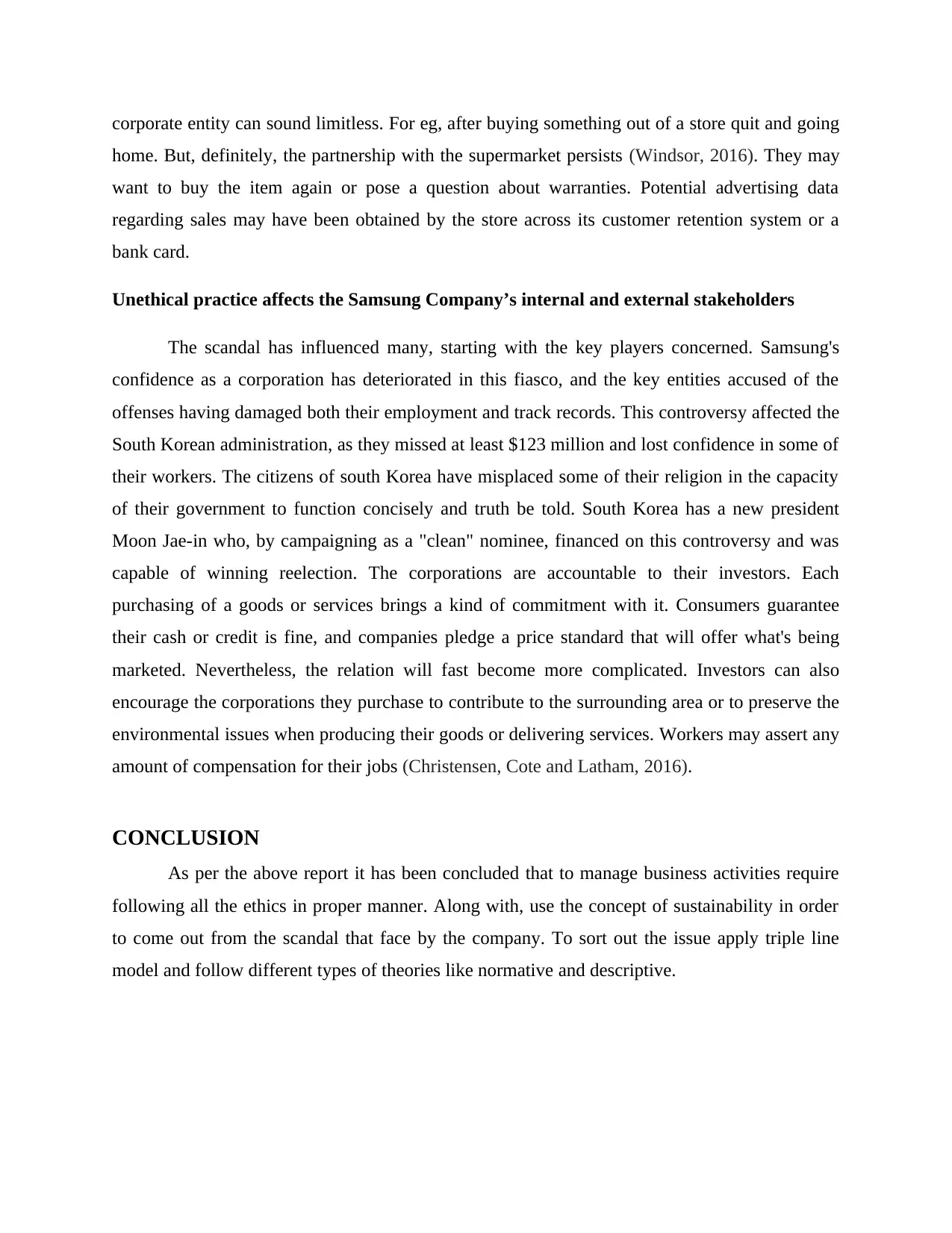
corporate entity can sound limitless. For eg, after buying something out of a store quit and going
home. But, definitely, the partnership with the supermarket persists (Windsor, 2016). They may
want to buy the item again or pose a question about warranties. Potential advertising data
regarding sales may have been obtained by the store across its customer retention system or a
bank card.
Unethical practice affects the Samsung Company’s internal and external stakeholders
The scandal has influenced many, starting with the key players concerned. Samsung's
confidence as a corporation has deteriorated in this fiasco, and the key entities accused of the
offenses having damaged both their employment and track records. This controversy affected the
South Korean administration, as they missed at least $123 million and lost confidence in some of
their workers. The citizens of south Korea have misplaced some of their religion in the capacity
of their government to function concisely and truth be told. South Korea has a new president
Moon Jae-in who, by campaigning as a "clean" nominee, financed on this controversy and was
capable of winning reelection. The corporations are accountable to their investors. Each
purchasing of a goods or services brings a kind of commitment with it. Consumers guarantee
their cash or credit is fine, and companies pledge a price standard that will offer what's being
marketed. Nevertheless, the relation will fast become more complicated. Investors can also
encourage the corporations they purchase to contribute to the surrounding area or to preserve the
environmental issues when producing their goods or delivering services. Workers may assert any
amount of compensation for their jobs (Christensen, Cote and Latham, 2016).
CONCLUSION
As per the above report it has been concluded that to manage business activities require
following all the ethics in proper manner. Along with, use the concept of sustainability in order
to come out from the scandal that face by the company. To sort out the issue apply triple line
model and follow different types of theories like normative and descriptive.
home. But, definitely, the partnership with the supermarket persists (Windsor, 2016). They may
want to buy the item again or pose a question about warranties. Potential advertising data
regarding sales may have been obtained by the store across its customer retention system or a
bank card.
Unethical practice affects the Samsung Company’s internal and external stakeholders
The scandal has influenced many, starting with the key players concerned. Samsung's
confidence as a corporation has deteriorated in this fiasco, and the key entities accused of the
offenses having damaged both their employment and track records. This controversy affected the
South Korean administration, as they missed at least $123 million and lost confidence in some of
their workers. The citizens of south Korea have misplaced some of their religion in the capacity
of their government to function concisely and truth be told. South Korea has a new president
Moon Jae-in who, by campaigning as a "clean" nominee, financed on this controversy and was
capable of winning reelection. The corporations are accountable to their investors. Each
purchasing of a goods or services brings a kind of commitment with it. Consumers guarantee
their cash or credit is fine, and companies pledge a price standard that will offer what's being
marketed. Nevertheless, the relation will fast become more complicated. Investors can also
encourage the corporations they purchase to contribute to the surrounding area or to preserve the
environmental issues when producing their goods or delivering services. Workers may assert any
amount of compensation for their jobs (Christensen, Cote and Latham, 2016).
CONCLUSION
As per the above report it has been concluded that to manage business activities require
following all the ethics in proper manner. Along with, use the concept of sustainability in order
to come out from the scandal that face by the company. To sort out the issue apply triple line
model and follow different types of theories like normative and descriptive.
Paraphrase This Document
Need a fresh take? Get an instant paraphrase of this document with our AI Paraphraser
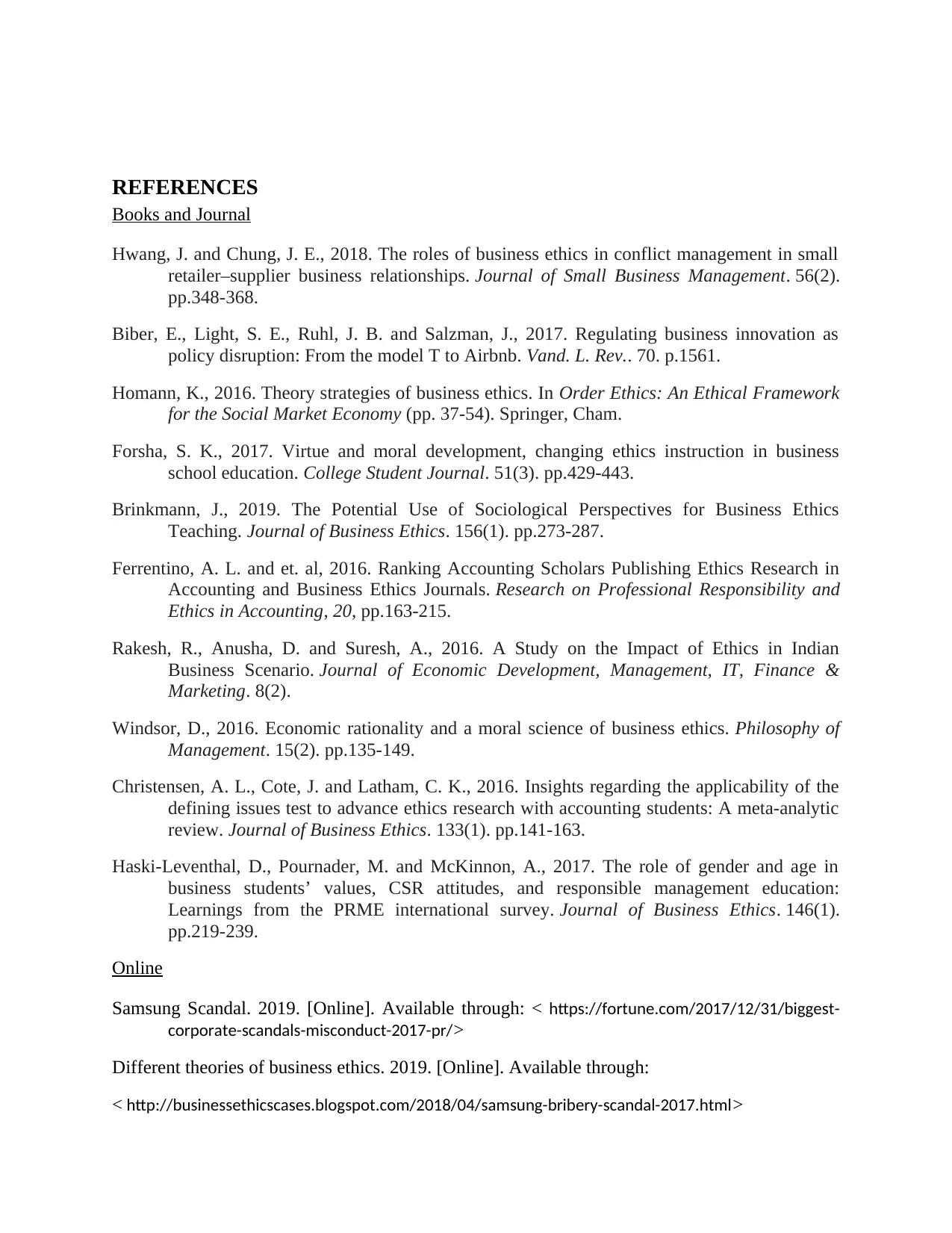
REFERENCES
Books and Journal
Hwang, J. and Chung, J. E., 2018. The roles of business ethics in conflict management in small
retailer–supplier business relationships. Journal of Small Business Management. 56(2).
pp.348-368.
Biber, E., Light, S. E., Ruhl, J. B. and Salzman, J., 2017. Regulating business innovation as
policy disruption: From the model T to Airbnb. Vand. L. Rev.. 70. p.1561.
Homann, K., 2016. Theory strategies of business ethics. In Order Ethics: An Ethical Framework
for the Social Market Economy (pp. 37-54). Springer, Cham.
Forsha, S. K., 2017. Virtue and moral development, changing ethics instruction in business
school education. College Student Journal. 51(3). pp.429-443.
Brinkmann, J., 2019. The Potential Use of Sociological Perspectives for Business Ethics
Teaching. Journal of Business Ethics. 156(1). pp.273-287.
Ferrentino, A. L. and et. al, 2016. Ranking Accounting Scholars Publishing Ethics Research in
Accounting and Business Ethics Journals. Research on Professional Responsibility and
Ethics in Accounting, 20, pp.163-215.
Rakesh, R., Anusha, D. and Suresh, A., 2016. A Study on the Impact of Ethics in Indian
Business Scenario. Journal of Economic Development, Management, IT, Finance &
Marketing. 8(2).
Windsor, D., 2016. Economic rationality and a moral science of business ethics. Philosophy of
Management. 15(2). pp.135-149.
Christensen, A. L., Cote, J. and Latham, C. K., 2016. Insights regarding the applicability of the
defining issues test to advance ethics research with accounting students: A meta-analytic
review. Journal of Business Ethics. 133(1). pp.141-163.
Haski-Leventhal, D., Pournader, M. and McKinnon, A., 2017. The role of gender and age in
business students’ values, CSR attitudes, and responsible management education:
Learnings from the PRME international survey. Journal of Business Ethics. 146(1).
pp.219-239.
Online
Samsung Scandal. 2019. [Online]. Available through: < https://fortune.com/2017/12/31/biggest-
corporate-scandals-misconduct-2017-pr/>
Different theories of business ethics. 2019. [Online]. Available through:
< http://businessethicscases.blogspot.com/2018/04/samsung-bribery-scandal-2017.html>
Books and Journal
Hwang, J. and Chung, J. E., 2018. The roles of business ethics in conflict management in small
retailer–supplier business relationships. Journal of Small Business Management. 56(2).
pp.348-368.
Biber, E., Light, S. E., Ruhl, J. B. and Salzman, J., 2017. Regulating business innovation as
policy disruption: From the model T to Airbnb. Vand. L. Rev.. 70. p.1561.
Homann, K., 2016. Theory strategies of business ethics. In Order Ethics: An Ethical Framework
for the Social Market Economy (pp. 37-54). Springer, Cham.
Forsha, S. K., 2017. Virtue and moral development, changing ethics instruction in business
school education. College Student Journal. 51(3). pp.429-443.
Brinkmann, J., 2019. The Potential Use of Sociological Perspectives for Business Ethics
Teaching. Journal of Business Ethics. 156(1). pp.273-287.
Ferrentino, A. L. and et. al, 2016. Ranking Accounting Scholars Publishing Ethics Research in
Accounting and Business Ethics Journals. Research on Professional Responsibility and
Ethics in Accounting, 20, pp.163-215.
Rakesh, R., Anusha, D. and Suresh, A., 2016. A Study on the Impact of Ethics in Indian
Business Scenario. Journal of Economic Development, Management, IT, Finance &
Marketing. 8(2).
Windsor, D., 2016. Economic rationality and a moral science of business ethics. Philosophy of
Management. 15(2). pp.135-149.
Christensen, A. L., Cote, J. and Latham, C. K., 2016. Insights regarding the applicability of the
defining issues test to advance ethics research with accounting students: A meta-analytic
review. Journal of Business Ethics. 133(1). pp.141-163.
Haski-Leventhal, D., Pournader, M. and McKinnon, A., 2017. The role of gender and age in
business students’ values, CSR attitudes, and responsible management education:
Learnings from the PRME international survey. Journal of Business Ethics. 146(1).
pp.219-239.
Online
Samsung Scandal. 2019. [Online]. Available through: < https://fortune.com/2017/12/31/biggest-
corporate-scandals-misconduct-2017-pr/>
Different theories of business ethics. 2019. [Online]. Available through:
< http://businessethicscases.blogspot.com/2018/04/samsung-bribery-scandal-2017.html>

Normative ethical theory. 2020. [Online]. Available through: <
https://link.springer.com/article/10.1007/s10677-011-9299-2>
Samsung sustainability. 2019. [Online]. Available through:<
https://www.samsungsdi.com/sustainable-management/index.html>
https://link.springer.com/article/10.1007/s10677-011-9299-2>
Samsung sustainability. 2019. [Online]. Available through:<
https://www.samsungsdi.com/sustainable-management/index.html>
⊘ This is a preview!⊘
Do you want full access?
Subscribe today to unlock all pages.

Trusted by 1+ million students worldwide
1 out of 12
Related Documents
Your All-in-One AI-Powered Toolkit for Academic Success.
+13062052269
info@desklib.com
Available 24*7 on WhatsApp / Email
![[object Object]](/_next/static/media/star-bottom.7253800d.svg)
Unlock your academic potential
Copyright © 2020–2026 A2Z Services. All Rights Reserved. Developed and managed by ZUCOL.





